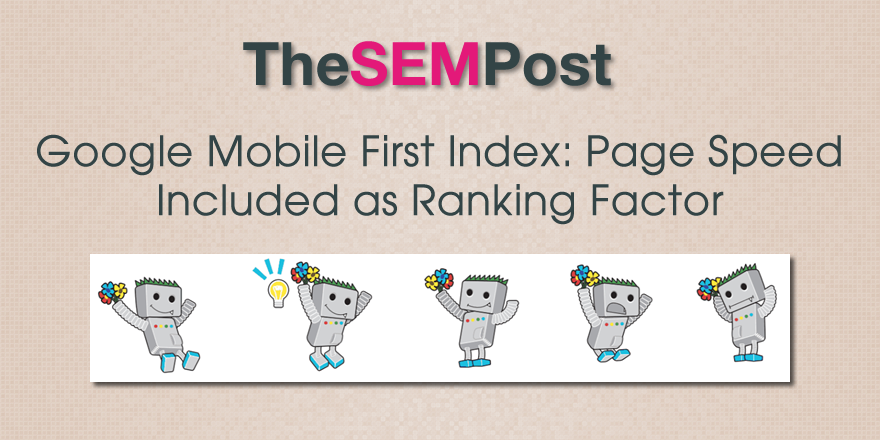 During yesterday’s Mobile First session at SMX, Gary Illyes from Google discussed page speed and how it would be incorporated into mobile first. Google has now said that they will be including mobile page speed in the upcoming mobile first indexing change, the first announcement that it would be a factor. And they are hoping to have the page speed component ready for when the index officially launches, according to Illyes.
During yesterday’s Mobile First session at SMX, Gary Illyes from Google discussed page speed and how it would be incorporated into mobile first. Google has now said that they will be including mobile page speed in the upcoming mobile first indexing change, the first announcement that it would be a factor. And they are hoping to have the page speed component ready for when the index officially launches, according to Illyes.
Recently, Google said that mobile page speed would not be a factor in the mobile first index change, which means even sites that take 30 seconds to load would not be downranked in the search results despite serving a very poor experience to the searcher. But for those who thought mobile page speed wouldn’t matter at all need to rethink that position.
Illyes said that the way Google calculates page speed for desktop doesn’t work for calculating it on mobile, so they need to launch a new one for mobile page speed. And using desktop page speed for a mobile index makes zero sense and would necessitate crawling the desktop version of the page to do so.
Page speed / mobile first: reinventing concept of page speed, bc the desktop page speed Google used won't work for mobile. @methode #smx
— Jennifer Slegg (@jenstar) March 22, 2017
Currently, Google does not include page speed in their mobile first experiments. But Google is aiming to have page speed be a factor when mobile first launches, which is important for SEOs and site owners to consider, since many sites are still serving a poor speed experience on mobile, since currently, Google only uses the desktop page speed for ranking.
Page speed as a factor on mobile may launch at same time as mobile first. Google will communicate more closer. @methode #smx
— Jennifer Slegg (@jenstar) March 22, 2017
So if you have a slow mobile experience currently, and you haven’t yet implemented AMP, then you might want to consider putting work into your mobile page speed, especially if Google is showing your mobile speed as excessively slow in their page speed insights tool.
When Mobile First is closer to launching, Google plans to communicate more specifics on page speed as part of the mobile first index, and whether it will launch with the new index or as a component after. But whether page speed is included at launch or shortly after, site owners should not just be thinking about Google in terms of how fast – or slow – their mobile pages are, but also what a slow time does to the user experience and the associated bounce rate.
Google will communicate about page speed on mobile as page speed gets closer. @methode #smx
— Jennifer Slegg (@jenstar) March 22, 2017
Bob Hockenberger says
Mobile First for indexing seearch results is important in itself, but no page speed is also becoming more important. I love the changing nature of SEO.
Caspar Hübinger says
There is that very unfortunate common misconception about what “page speed” is. Many people think “page speed” equals the Google PageSpeed Insights Score while the actual speed of a page would be it’s load time which PageSpeed Insights doesn’t even measure.
Would you be able to clarify how you use the term “page speed” in this article?
Are you saying the score from Google PageSpeed Insights will be a ranking factor?
Or are you referring to actual page load times (as in: milliseconds until a document is rendered) as a ranking factor.
Disclosure: I do customer support for a WordPress caching plugin, and the distinctions of “PageSpeed” (Google score) versus “page speed” (load times) causes quite a bit of confusion amongst our customers.
Would appreciate clarification a lot, thanks!
Jennifer Slegg says
Google hasn’t clarified beyond page speed for mobile first specifically, but they have said they will share more information closer to the launch. But generally, if your site is already fast and you increase it a bit, it won’t do much. But if your site is really slow loading for users, then it would be impacted.